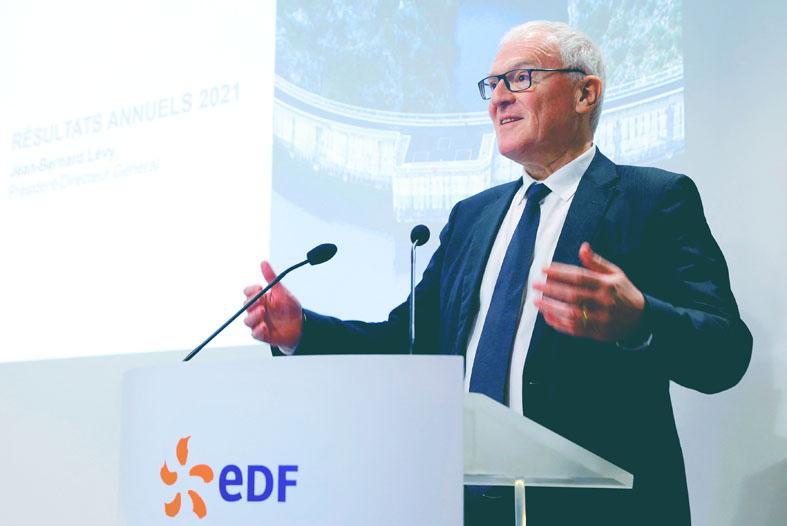Electricite de France (EDF) SA and the French government yesterday said the process of finding a new CEO for the power utility has begun, a day after the government announced its plan to fully renationalize the debt-laden power giant.
“The state and Jean-Bernard Levy have agreed to launch the succession process from now,” the French Ministry of Economy and Finance, which manages the state’s 84 percent stake in EDF, said in a statement.
EDF confirmed the decision, adding in a separate statement that CEO Levy, whose term officially ends next year, was prepared to step down as soon as a successor is found.

Photo: Reuters
Asked on the ideal profile for the top job at EDF, French Minister of the Economy and Finance Bruno Le Maire said he was looking for somebody with a “sense for compromise,” referring to EDF’s need to navigate in a highly regulated environment while working with the utility’s strong unions.
French Prime Minister Elisabeth Borne on Wednesday announced plans to fully nationalize EDF in a move that would give the government more control over restructuring the debt-laden group while contending with a European energy crisis.
Le Maire yesterday rejected criticism that the government was nationalizing the company at a time when it is likely to incur massive losses, hit by energy price caps and years of delays on new nuclear plants in France and Britain, with budget overruns in the billions of euros.
“I deeply believe in EDF’s future,” Le Maire said.
French Minister of Public Action and Accounts Gabriel Attal earlier said it was too early to estimate the full nationalization of EDF.
“This will depend on the company’s shares,” Attal said, referring to the approximately 15 percent of the company traded on the stock market.
Buying the shares the government does not already own at current prices would cost about 5 billion euros (US$5.1 billion).

CHIP RACE: Three years of overbroad export controls drove foreign competitors to pursue their own AI chips, and ‘cost US taxpayers billions of dollars,’ Nvidia said China has figured out the US strategy for allowing it to buy Nvidia Corp’s H200s and is rejecting the artificial intelligence (AI) chip in favor of domestically developed semiconductors, White House AI adviser David Sacks said, citing news reports. US President Donald Trump on Monday said that he would allow shipments of Nvidia’s H200 chips to China, part of an administration effort backed by Sacks to challenge Chinese tech champions such as Huawei Technologies Co (華為) by bringing US competition to their home market. On Friday, Sacks signaled that he was uncertain about whether that approach would work. “They’re rejecting our chips,” Sacks

It is challenging to build infrastructure in much of Europe. Constrained budgets and polarized politics tend to undermine long-term projects, forcing officials to react to emergencies rather than plan for the future. Not in Austria. Today, the country is to officially open its Koralmbahn tunnel, the 5.9 billion euro (US$6.9 billion) centerpiece of a groundbreaking new railway that will eventually run from Poland’s Baltic coast to the Adriatic Sea, transforming travel within Austria and positioning the Alpine nation at the forefront of logistics in Europe. “It is Austria’s biggest socio-economic experiment in over a century,” said Eric Kirschner, an economist at Graz-based Joanneum

BUBBLE? Only a handful of companies are seeing rapid revenue growth and higher valuations, and it is not enough to call the AI trend a transformation, an analyst said Artificial intelligence (AI) is entering a more challenging phase next year as companies move beyond experimentation and begin demanding clear financial returns from a technology that has delivered big gains to only a small group of early adopters, PricewaterhouseCoopers (PwC) Taiwan said yesterday. Most organizations have been able to justify AI investments through cost recovery or modest efficiency gains, but few have achieved meaningful revenue growth or long-term competitive advantage, the consultancy said in its 2026 AI Business Predictions report. This growing performance gap is forcing executives to reconsider how AI is deployed across their organizations, it said. “Many companies

France is developing domestic production of electric vehicle (EV) batteries with an eye on industrial independence, but Asian experts are proving key in launching operations. In the Verkor factory outside the northern city of Dunkirk, which was inaugurated on Thursday, foreign specialists, notably from South Korea and Malaysia, are training the local staff. Verkor is the third battery gigafactory to open in northern France in a region that has become known as “Battery Valley.” At the Automotive Energy Supply Corp (AESC) factory near the city of Douai, where production has been under way for several months, Chinese engineers and technicians supervise French recruits. “They